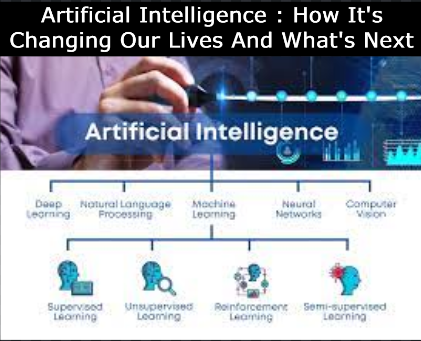Artificial Intelligence : How It’s Changing Our Lives And What’s Next
Artificial intelligence (AI) has become an increasingly common term in our daily lives. From virtual assistants like Siri and Alexa to the algorithms that power our social media feeds, AI is being integrated into various aspects of our lives. Here’s a closer look at how AI is transforming our world and what we can expect next for this rapidly-evolving technology.
One of the most significant impacts of AI on our lives is its ability to automate mundane tasks and improve efficiency. In the healthcare industry, AI-powered tools can analyze vast amounts of medical data and assist in diagnosing diseases. Self-driving cars powered by AI are poised to revolutionize the way we travel. AI is also transforming the way we interact with technology. Virtual assistants like Siri and Alexa can understand natural language and perform tasks like setting reminders, playing music, and ordering groceries. Chat bots are becoming increasingly popular in customer service, providing quick and efficient support to users.
AI is also changing the way businesses operate. AI-powered tools can help companies automate routine tasks, analyze customer data, and improve decision-making. For example, AI-powered chat bots can provide 24/7 customer support, freeing up human agents to handle more complex inquiries. AI can also help businesses identify trends and patterns in data that may not be immediately apparent to humans. This can be especially useful in industries like finance, where AI-powered algorithms can analyze vast amounts of financial data and provide insights into market trends.
What’s Next for AI?
As AI technology continues to evolve, we can expect to see even more significant changes in the years ahead. One area where AI is expected to have a significant impact is in healthcare. AI-powered tools can help doctors diagnose diseases more accurately and develop personalized treatment plans for patients. Another area where AI is expected to have a significant impact is in the field of robotics. As robots become more advanced and intelligent, they will be able to perform increasingly complex tasks and work alongside humans in a range of industries. Finally, AI is poised to transform the way we interact with technology. With advancements in natural language processing, AI-powered virtual assistants will become even more intuitive and capable, allowing us to interact with technology in more natural and seamless ways.
In conclusion, AI is already having a profound impact on our lives, from improving efficiency and automation to transforming the way we interact with technology. As this technology continues to evolve, we can expect to see even more dramatic changes in the years ahead, with AI-powered tools playing an increasingly important role in healthcare, robotics, and many other industries.





















